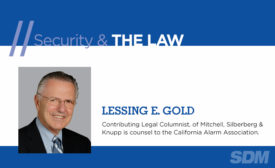Security & the Law
Security & the Law
Is Alarm Company Responsible for Plaintiff’s Flood Damage?
December 3, 2019
Security & The Law
Does Monitoring Contract With Tenants Entitle Building Insurance Provider to Reimbursement?
INSURANCE LAWSUIT
October 7, 2019
Security & The Law
Prominent Liability Clause Protects an Alarm Company That Failed to Respond
ALARM CONTRACTS
September 2, 2019
Security & The Law
Burglar Alarm Responding Sheriff Causes Traffic Accident — Was he Liable?
August 5, 2019
Security & The Law
Local Government Can’t Preempt State Law in Security Wage Dispute
June 3, 2019
Get our new eMagazine delivered to your inbox every month.
Stay in the know on the latest security marketplace trends.
SUBSCRIBE TODAY!Copyright ©2024. All Rights Reserved BNP Media.
Design, CMS, Hosting & Web Development :: ePublishing

